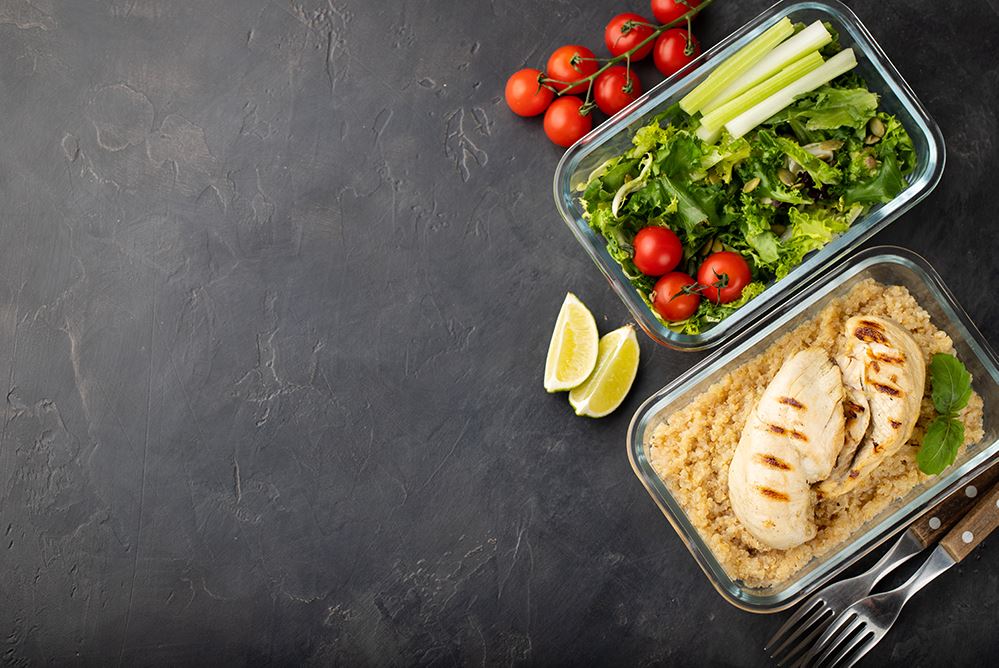
How To Meal Prep Like A Pro
If you want to learn how to meal prep like a pro, you have come to the right place. In this article, you will discover a seven-step plan to save many hours and boost diet adherence through effective meal prepping.
Step 1: Determine Your Macros
Calories and macros form the foundation of every successful meal plan.
Calories are essential because they are the main determinants of body weight changes, while macros help you to optimise muscle mass, to recover between workouts, to support athletic performance, and more.
Therefore, your first step to meal prep properly is to determine your calorie and macro targets. While it is beyond the scope of this article to explain how to do so, this guide we did previously will help.
Step 2: Plan Your Week in Advance
Now that you know your macros, it is time to set up your meal plan – one that hits your calorie and macronutrient targets.
Planning your week in advance will not only save you a lot of time, but it will also make you eat more healthily, reduce the likelihood you’ll eat out, and enhance your diet adherence.(1)
So, block out some time each week to create your food agenda. If you tend to eat together with family, friends, or a partner, it is best to discuss the details together to make sure you are all on the same page.
When it comes to ensuring that your meal plan hits your calorie and macronutrient targets, you can use meal-planning apps such as Mealime, PlateJoy, and Eat This Much.
Alternatively, you can design your meal plan yourself and calculate the calorie and macronutrient contents with tracking apps such as Cronometer.
If you go for the latter option, remember that your meal plan does not have to be elaborate. Sure, it is okay to put your culinary skills to use with fancy dishes. But if you want to save time, basic meals are also fine.
What is most important is that you hit your calorie and macro targets. As long as you do that with healthy meals, you will be good to go.
Also, keep in mind that if there is a particular recipe you love, it’s fine to include that dish in your meal plan several times. That will help you save time when you prepare the food.
Step 3: Design Your Shopping List
After you have created your food agenda, note all the ingredients you will need for the upcoming week.
Having such a list not only saves you time at the supermarket, but it also makes you less likely to bring home unhealthy foods, and it will reduce cooking time since you will have access to all the ingredients you need.
When you create your grocery list, make sure to organise the ingredients by food group. That will help you save time by reducing the need to go back to a section of the supermarket that you have already visited.
Step 4: Buy Your Groceries in Bulk
Now that you have your grocery list, it is time to hit the supermarket. To save time, you may want to do the groceries only once a week. But if you prefer fresher fruits and vegetables, going more often is also fine.
What is important, however, is to avoid the attraction to buy foods that are not on your grocery list. That is because once junk food worms its way into your home, the temptation to indulge is tough to resist.
One tip that can help here is only to do your grocery shopping after a meal. Research shows that buying food on an filled stomach causes us to bring home lower-calorie foods compared to shopping on an empty stomach.(2)
Also, if your budget allows it, it could be useful to use a grocery delivery service since that will save time and reduce the likelihood that you will buy junk foods.
Step 5: Cook Your Meals Once per Week
To meal prep most efficiently, free up one afternoon or evening each week to prepare all your meals for the week.
Not only will cooking in bulk save you time, but it will also aid your diet adherence since you will always have your planned foods available.
When you cook many meals at once, however, make sure that your meal plan contains recipes that require different cooking equipment; for instance, the hob, the oven, and a slow cooker.
That allows you to prepare the most dishes at once, which helps you save the most amount of time.
Step 6: Store Your Foods
Once you have finished prepping your meals, it is time to store the foods away.
Before you do this, however, make sure to let the foods cool down. That will prevent dishes that contain a lot of water from becoming soggy when you place them in your fridge or freezer.
Also, when you store your meals in storage containers, make sure the portions are according to those in your meal plan, so that you do not have to re-calculate the calorie and macro content later on.
As a general guideline, store the foods you will consume within three days in the fridge. Place the rest in your freezer.
Step 7: Track Your Progress
While you should now have all the meals ready that you will need for the upcoming few days or even for the entire week, there are two reasons why it is still best to monitor your food intake with a tracking app.
First, unplanned events may prevent you from consuming the foods that are on your meal plan. With the tracking app, you can find alternative foods that match the calorie and macro content of your original meal.
Second, the mere act of tracking your food intake can help you stick to your diet. Studies show that monitoring food intake makes you less likely to cheat on your diet and thus more likely to reach your goals.(3)(4)(5)
